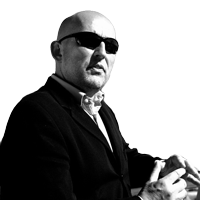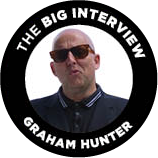THE memories of May 26, 2014 are always within reach for Benni McCarthy. When I invited him to retrace his steps to the Arena AufSchalke, Gelsenkirchen during this Big Interview, he painted a beautiful picture of that day with a combination of vibrant stories and an array of colourful photos saved on his phone. By simply tapping the screen a few times, Benni transported us on to the pitch, joining the celebrations of his Porto team-mates in the exhilarating moments before the cup was presented.
The grinning faces of Benni, of Deco, Dmitri Alenichev and Carlos Alberto could be seen clearly – a reminder that this was a Porto team replete with clever, talented footballers, however unexpected their journey to the final had been.
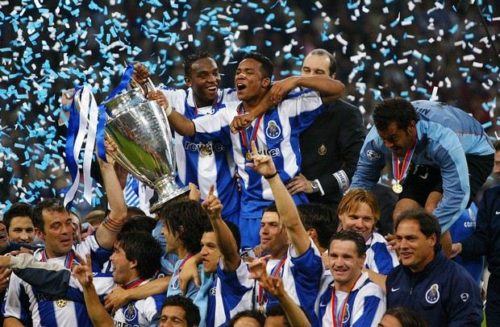
It was also one of the last moments that all of them would be together.
That remarkable success, when Porto won 3-0 as they swept Monaco aside in the final, launched the careers of so many of that triumphant side, Benni among them. Below, I have aggregated the players who comprised Porto’s match day squad in the final and explain what happened to them after their historic victory 13 years ago.
Vitor Baia
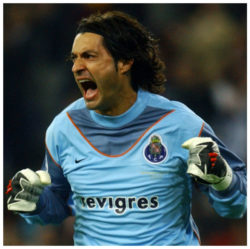
His career at Porto spanned almost 20 years, interrupted only by two and a half seasons with FC Barcelona. Winning the Champions League 13 years ago was arguably his greatest feat, albeit Baia got his gloves on plenty of silverware as a footballer. After conquering Europe with Porto, the goalkeeper won two more Primeira Liga titles – taking his tally to 10 – before retiring as a club legend in 2007.
Nuno
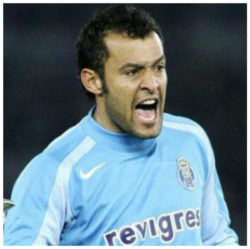
Back up to Baia during the triumphant Champions League campaign, he left Porto seven months later and signed for Dynamo Moscow. Would return to Portugal two years later with Aves, before rejoining Porto until his retirement in 2010. Last year, Nuno returned to the Estadio do Dragao for a second time, this time as manager. Was sacked earlier this month after failing to deliver a trophy.
Paulo Ferreira
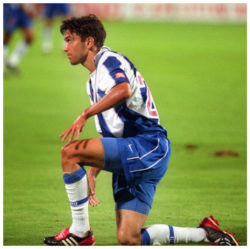
One of five Porto players who would be reunited with Jose Mourinho at Chelsea, joining the London club for £13.2 million within a month of lifting the Champions League in Gelsenkirchen. He stayed at Stamford Bridge for nine years, during which Ferreira celebrated a second Champions League triumph, when the full-back was an unused substitute as Chelsea squeezed past Bayern Munich on penalties in 2012. Retired from playing a year later and joined the technical staff at Chelsea.
Jorge Costa
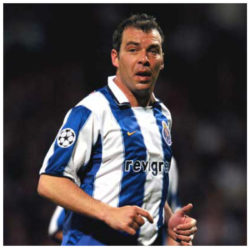
Known as “The Beast” by his Porto team-mates, Costa was a pillar of the Porto team which triumphed in 2004. Already 32 when he lifted the Champions League trophy, Costa remained at the club for two more years before ending his playing career with a five-month spell in Belgium with Standard Liege. Has since had a far more itinerant career as a manager – working at clubs in Portugal, Romania, Cyprus and Tunisia. Also spent time in charge of the Gabon national team.
Ricardo Carvalho
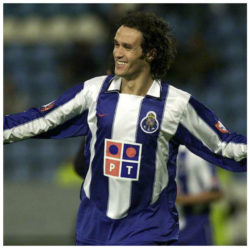
Referred to as “Sandrina” by Benni in the podcast but better known as a wily, resilient central defender who has won trophies for club and country. His performances for Porto attracted interest from Europe’s elite clubs at the end of the 2003/04 season, with Carvalho choosing to follow Mourinho to Stamford Bridge. He won two league titles under the manager in England and another after reuniting with Mourinho at Real Madrid. Now 39, Carvalho plays for Chinese team Shanghai SIPG.
Nuno Valente
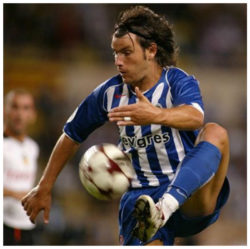
Another member of this Porto team who would move to England, though Valente did not join Chelsea. Instead, the left-back signed for Everton in 2005 – a move facilitated in part by a fall out with Porto president Jorge Nuno Pinto da Costa – and stayed on Merseyside for four years, before retiring having fallen down the pecking order. Later worked as a scout for Everton and then as a coach alongside compatriot Paulo Sergio at Sporting Lisbon.
Ricardo Costa
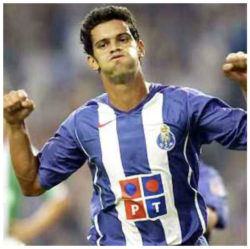
Left Porto in 2007 having spent much of his time sitting on the bench, including during the Champions League final. The defender played more often during spells in Germany – where he won the Bundesliga title with Wolfsburg – Qatar, Greece and Spain. He is playing currently with Swiss side FC Luzern.
Jose Bosingwa
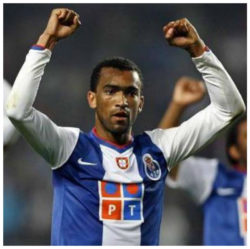
The full-back was still just 21 in 2004 – he was an unused substitute in Gelsenkirchen – and established himself in the Porto first team only after the departure of Ferriera. The pair were reunited at Chelsea in 2008 and celebrated another Champions League triumph together in 2012, with Bosingwa this time playing in the final. Has played for Queens Park Rangers and Trabzonspor since.
Costinha
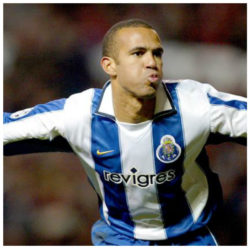
Renowned for being sharply dressed off the pitch and always looking the part on it, the Portuguese played for one more season in his homeland before moving on to Dynamo Moscow in 2005. Costinha then spent time at Atletico Madrid and Atalanta, retiring in 2010 when he was appointed director of football at Sporting Lisbon. He performed a similar role at Swiss club Servette before returning to Portugal to become a manager in his own right, first at Beria-Mar and then Pacos Ferreira. He took charge of Academica last year.
Pedro Mendes
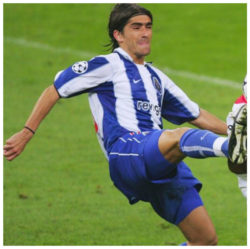
Spent just one season at the Estadio do Dragao, lifting the Portuguese Super Cup, the league title and the Champions League, before picking up the phone when Tottenham Hotspur came calling. The midfielder stayed at White Hart Lane for only 18 months before moving on to Portsmouth, where he got his hands on the FA Cup in 2008. Mendes won a league title with Rangers a year later before returning to Portugal to see out his playing career at Sporting and Vitoria de Guimareas.
Maniche
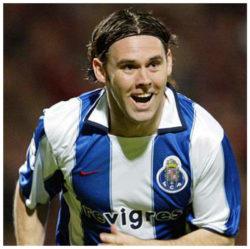
His ego almost cost the midfielder his career at Porto before Benni spoke up for him. Maniche started in all but one of Porto’s Champions League matches in 2003/04 – he was rested in a draw at the Bernabeu during the group stage – and scored three times en rout to the final. Later signed for Dynamo Moscow, where he was loaned out to Chelsea, and Atletico Madrid, where he was sent out to Internazionale, before short spells at Cologne and Sporting. Served as assistant coach to Costinha at Pacos Ferreira and Academica.
Pedro Emanuel
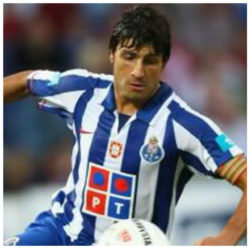
Played for the final five minutes against Monaco after coming on as the third substitute and one of the few members of that Porto squad who remained at the club afterwards. Was later appointed captain under head coach Co Adriaanse and led Porto to the league title in 2009 before becoming a member of the club’s coaching staff. Has since been a manager of clubs in Portugal and Cyprus.
Dmitri Alenichev
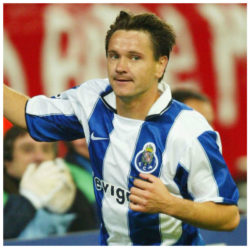
Russian featured regularly as a substitute in the Champions League and made the most of his cameo in Gelsenkirchen, scoring the third goal for Porto. Asked to return to former club Spartak Moscow following the final and spent two seasons at the club before a row with manager Aleksandrs Starkovs precipitated the end of the midfielder’s career. Became a politician in 2007, joining the ruling United Russia party, before returning to football as a coach.
Deco
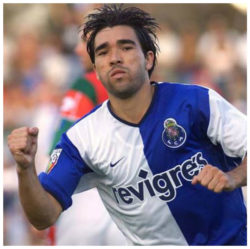
The star of this indomitable Porto side. There had often been questions asked of his consistency – Benni recalls Deco’s “rollercoaster” form in the podcast – but the Brazil-born Portugal internationalist’s ended the 2003/04 season as one of the most desired players in Europe. It was inevitable that Deco would move on after the Champions League final and the midfielder joined Barcelona that summer, despite persistent reports that he would follow Mourinho to Stamford Bridge. Deco did eventually arrive at Chelsea – he won a league and cup double in 2010 – before ending his career at Fluminense.
Carlos Alberto
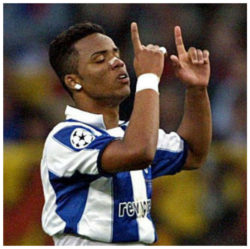 Scored the first of Porto’s goals in the final with an instinctive volley – ensuring that his only successful strike in the competition that season was a memorable one. The Brazilian stayed at Porto until the turn of the year when he signed for Corinthians in his homeland, the first in a litany of tumultuous transfers involving the forward. After his relationship with his manager at Corinthians deteriorated within a year of Alberto’s arrival, he was loaned to Fluminense. He then returned to Europe with Werder Bremen but spent most of his time back on loan to clubs in Brazil, later signing permanent deals at Vasco da Gama, Goias, Botafogo and Figueirense. Now 32, Alberto is playing for his 13th senior club, Atlético Paranaense.
Scored the first of Porto’s goals in the final with an instinctive volley – ensuring that his only successful strike in the competition that season was a memorable one. The Brazilian stayed at Porto until the turn of the year when he signed for Corinthians in his homeland, the first in a litany of tumultuous transfers involving the forward. After his relationship with his manager at Corinthians deteriorated within a year of Alberto’s arrival, he was loaned to Fluminense. He then returned to Europe with Werder Bremen but spent most of his time back on loan to clubs in Brazil, later signing permanent deals at Vasco da Gama, Goias, Botafogo and Figueirense. Now 32, Alberto is playing for his 13th senior club, Atlético Paranaense.
Derlei
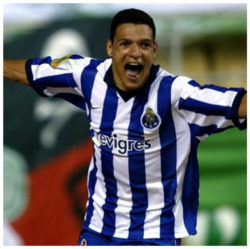
Partnered his compatriot, Alberto, in attack in the 2004 final, having scored decisively against Deportivo La Coruna in the semi-finals. Remained at Porto for a further eight months after lifting the trophy, moving on to enjoy a fruitful spell at Dynamo Moscow. Returned to Portugal in 2007 to play for Benfica, Sporting, Vitoria and Madureira. Retired in 2010.
Benni McCarthy
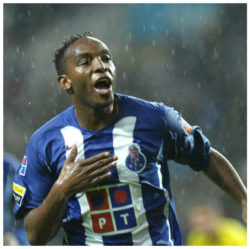
The star of this podcast and a lead character in the story of how Porto conquered Europe. A late substitute in the final, the South African was his side’s leading scorer in the competition – his four-goal haul including two against Manchester United. Those strikes ensured that the striker would be linked persistently with moves to England, and Benni agreed a move to Blackburn Rovers two years after winning the Champions League. He finished his first season in the Premier League as the second top goalscorer – his 18-goal tally was just two fewer than Didier Drogba – before he switched to West Ham United in 2010. A move to Orlando Pirates a year later allowed Benni to finish his playing career in his homeland, while he is now living in Edinburgh and pursuing a career in coaching.
Edgaras Jankauskas
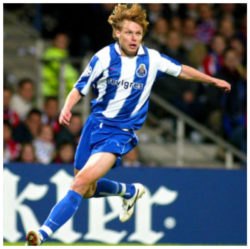
An unused substitute in the final, having featured from the bench in each of the preceding rounds. Out of favour in the following year, the Lithuanian moved on to play in France, Scotland, Cyprus, Latvia, the United States and Russia. Retired in 2011 to begin a coaching career and was named head coach of the Lithuania national team last year.
Jose Mourinho
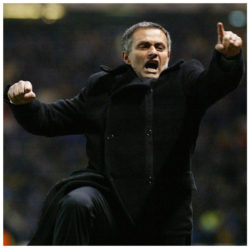
Whatever happened to the young coach who conquered all that lay before him at Porto? By the time he arrived in Gelsenkirchen, Mourinho knew that he was leaving to join Chelsea, a career decision which made him a target of Porto’s ultras: the Super Dragons. He became a hero of Chelsea supporters as he collected consecutive league titles at Stamford Bridge before harvesting more silverware – including another Champions League trophy – at Internazionale and Real Madrid. A return to Chelsea in 2013 led to another league title, with Mourinho currently in charge of Manchester United.
